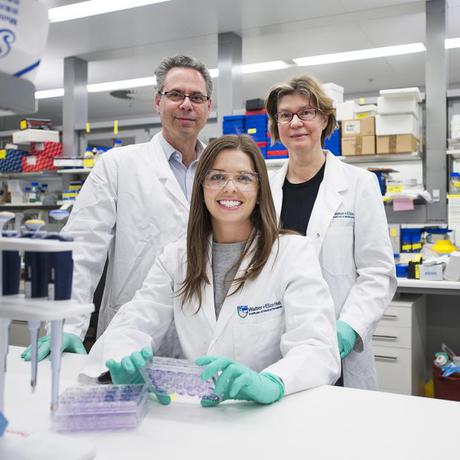Preventing breast cancer in high-risk women

Researchers led by the Walter and Eliza Hall Institute (WEHI) have found that the drug denosumab may have the potential to prevent breast cancer in women carrying a faulty BRCA1 gene. If confirmed in clinical studies, this would provide a non-surgical option for breast cancer prevention in women with an elevated genetic risk.
People who carry a faulty BRCA1 gene are at high risk of developing aggressive breast cancer. Currently, many women with a gene mutation choose surgical removal of their breast tissue and ovaries to reduce their chance of developing breast and ovarian cancer.
Using samples of breast tissue donated by women carrying a faulty BRCA1 gene, Emma Nolan, Professor Jane Visvader and Professor Geoff Lindeman were able to pinpoint “the precise cells that are the culprits in cancer formation”, said Professor Visvader. Their research has been published in the journal Nature Medicine.
As explained by Nolan, cancer precursor cells in BRCA1-mutant breast tissue have many similarities to aggressive forms of breast cancer. “These cells proliferated rapidly and were susceptible to damage to their DNA — both factors that help them transition towards cancer,” she said. “We were excited to discover that these precancerous cells could be identified by a marker protein called RANK.”
Professor Lindeman said the discovery of RANK as a marker of cancer precursors was an important breakthrough because inhibitors of the RANK signalling pathway were already in clinical use, with denosumab used in the clinic to treat osteoporosis and breast cancer that has spread to the bone. “We therefore investigated what effect RANK inhibition had on the cancer precursor cells in BRCA1-mutant breast tissue,” he said.
The research team showed that RANK inhibition switched off cell growth in breast tissue from women with a faulty BRCA1 gene and curtailed breast cancer development in laboratory models. According to Professor Lindeman, “We think this strategy could delay or prevent breast cancer in women with an inherited BRCA1 gene mutation.”
Professor Lindeman added that a concurrent study led by an Austrian group has also identified the importance of RANK. “Complementary approaches were used,” he said. “They deleted the RANK gene during development. We switched off the RANK pathway using an inhibitor to recapitulate a breast cancer prevention study in humans. Both studies suggest that targeting RANK offers hope to women at high genetic risk for breast cancer.”
Retinal health linked to dementia risk, study shows
Researchers have discovered that the blood vessels at the back of the eye — called retinal...
Pancreatic cancer hijacks metabolism switch to help it spread
Pancreatic cancer hijacks a molecule known for regulating physiological processes, such as food...
Novel antibiotic activates 'suicide' mechanism in superbug
Researchers have discovered a new class of antibiotic that selectively targets Neisseria...




